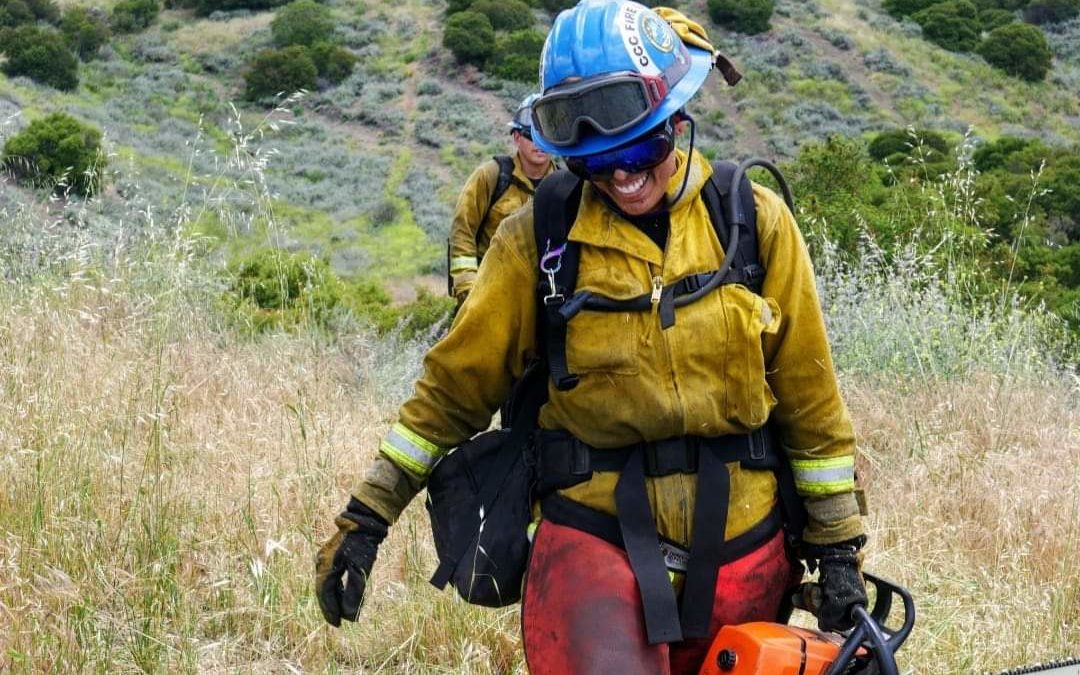Since 1970, the frequency of U.S. wildfires has skyrocketed. To combat this problem California utilizes incarcerated people in conservation camps, commonly referred to as fire camps, as a significant labor force – totaling 35% of the firefighting force. These individuals, however, have been largely shut out from pursuing firefighting careers post-release. The Forestry and Fire Recruitment Program (FFRP) is working to make this transition easier. Launched in 2015, they coach and assist participants through the laborious process of transitioning from fire camps to full-time, paid members of California’s firefighting force. Their programming is designed to help thousands of individuals in fire camps obtain gainful employment post-release by providing them with necessary transitional employment, career, life skills and wraparound wellness services.To aid in this effort, they have been awarded a Michelson Spark Grant that will further their work in building a self-sustainable fee-for-service model that provides transitional employment and reentry support while supporting participants as they navigate the firefighting career maze.
The California Department of Corrections and Rehabilitation (CDCR), in cooperation with the California Department of Forestry and Fire Protection (CAL FIRE) and the Los Angeles County Fire Department (LAC FIRE) currently operate 43 fire camps across 27 counties. Many of the camps are located in remote areas where fires are most likely to break out. With 8 of the fire camps scheduled to close this year, FFRP is well suited to support formerly incarcerated individuals in meeting California’s fire fighting labor shortage.
Only a small percentage of the total incarcerated population in California can currently serve in fire camps since only inmates with less serious felony offenses are allowed to participate. While the camps can accommodate up to 4,234 inmates, as of September about 2,500 inmates were battling California’s unrelenting wildfires. This year, inmate firefighters have helped battle most of the major fires that have burned 4 million acres in California — a modern record.
The founder of FFRP, Brandon Smith, is himself a formerly incarcerated fire camp resident who successfully transitioned to become a full-time firefighter after returning home from prison. A few years earlier in 2012, Brandon was serving time in a California prison when he seized an opportunity to join an inmate crew and fight forest fires. “Seeing all these families of the homes we helped save, and they all had these flags and they’re saying ‘thank you, thank you, thank you,’” he says. “It recentered my sense of worth. I felt like I was giving back to the community.”
Brandon’s story highlights the redemptive power of firefighting while incarcerated, unfortunately he learned pursuing firefighting as a career was challenging when he returned home in 2014. “There was no way the U.S. Forest Service, CalFire, or any local fire agency would hire me,” he said. Brandon’s criminal record with 2 felony convictions, and the fact that he was on parole, barred him from getting certified as an emergency medical technician (EMT). EMT certification is a prerequisite in most places for becoming a firefighter.
To help former fire camp residents obtain the training, qualifications, and network support needed to pursue careers in firefighting, Brandon founded FFRP. Today, the organization operates from a lived truth that individuals can effectively improve themselves and their communities by obtaining gainful employment in public safety careers. Firefighting presents one viable high wage career path for those individuals who have volunteered to join fire camps and serve their communities literally in the line of fire. With earning potential post incarceration starting at approximately $40,000 a year and up to $100,000 it can change the life trajectory of many individuals and their families post-release.
Despite the extensive training and experience gained during fire camp, formerly incarcerated firefighters face significant barriers to entering these careers upon release. Fortunately, laws are beginning to change to make it easier for formerly incarcerated firefighters to obtain EMT certification and pursue firefighting as a career when they return home. In September Governor Newsom signed AB 2147 into law, making it easier for fire camp residents who served on fire crews with nonviolent convictions to expunge their records and become professional firefighters and EMTs. “Inmates who have stood on the frontlines, battling historic fires should not be denied the right to later become a professional firefighter,” shared Governor Newsom in a post after signing the bill. It is important to note that the new California law does not apply to murder, arson, sex crime, kidnapping and other serious felony convictions. “The bill is most effective to those people who you would consider first-time offenders,” Brandon says.
We proudly stand alongside Brandon and others to support FFRP in helping the thousands of individuals in fire camps obtain gainful employment as firefighters post-release. “Expanding this career option to formerly incarcerated individuals provides one more redemption avenue for them to rebuild their lives once their debt to society has been paid,” said Dr. Gary Michelson, founder of Michelson 20MM.
About Michelson 20MM
Michelson 20MM is dedicated to supporting and investing in leading organizations, technologies, and initiatives that seek to transform learning and improve access to educational opportunities that lead to a meaningful career.
In 2019 the Smart Justice Initiative (SJI) was launched to support individuals and communities impacted by our country’s punitive legal system to forge brighter, more prosperous futures through educational attainment that leads to meaningful careers. We believe that postsecondary education is transformative, both as a catalyst for personal change, as well as justice system reform.


What if you never served time in a state prison so therefore never participated in a fire camp but are a convicted felon who has served a prison term in county jail and would like to pursue a career in firefighting? Can your program help in any way?